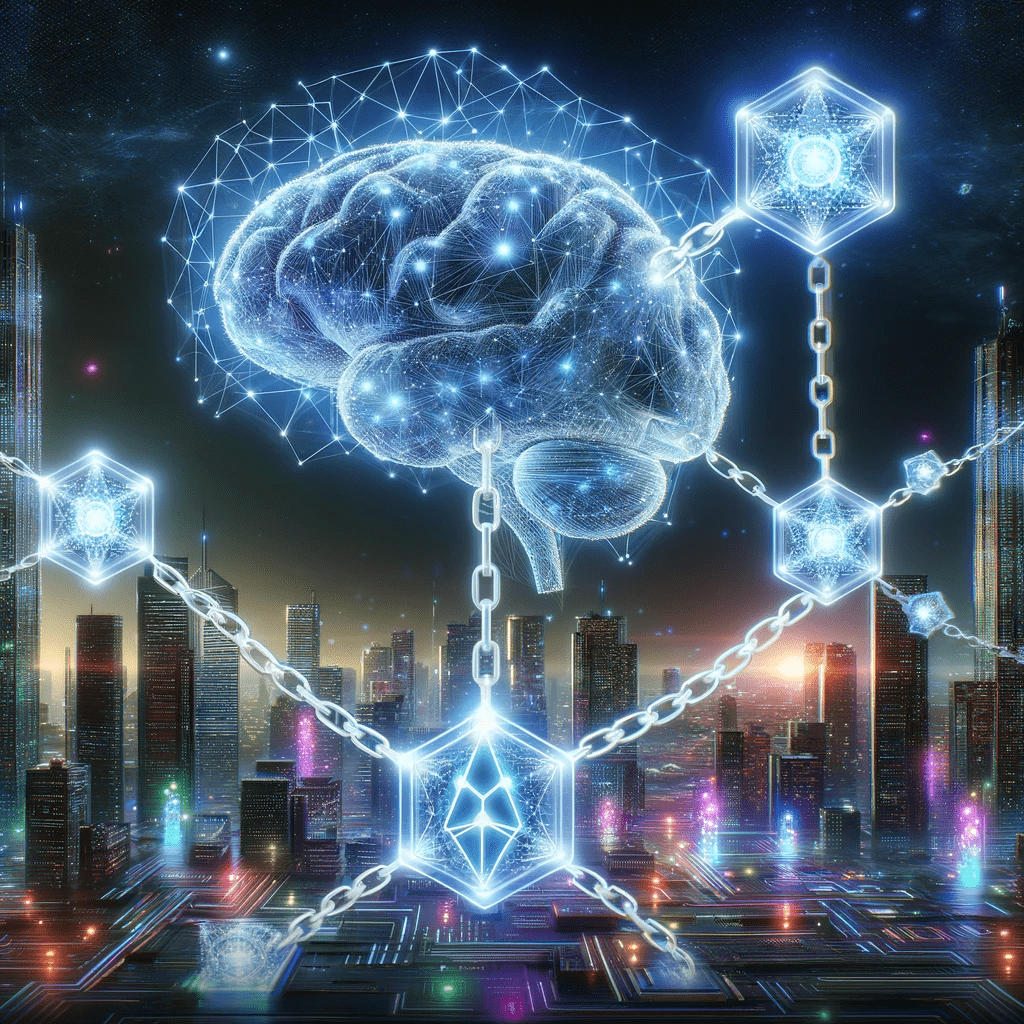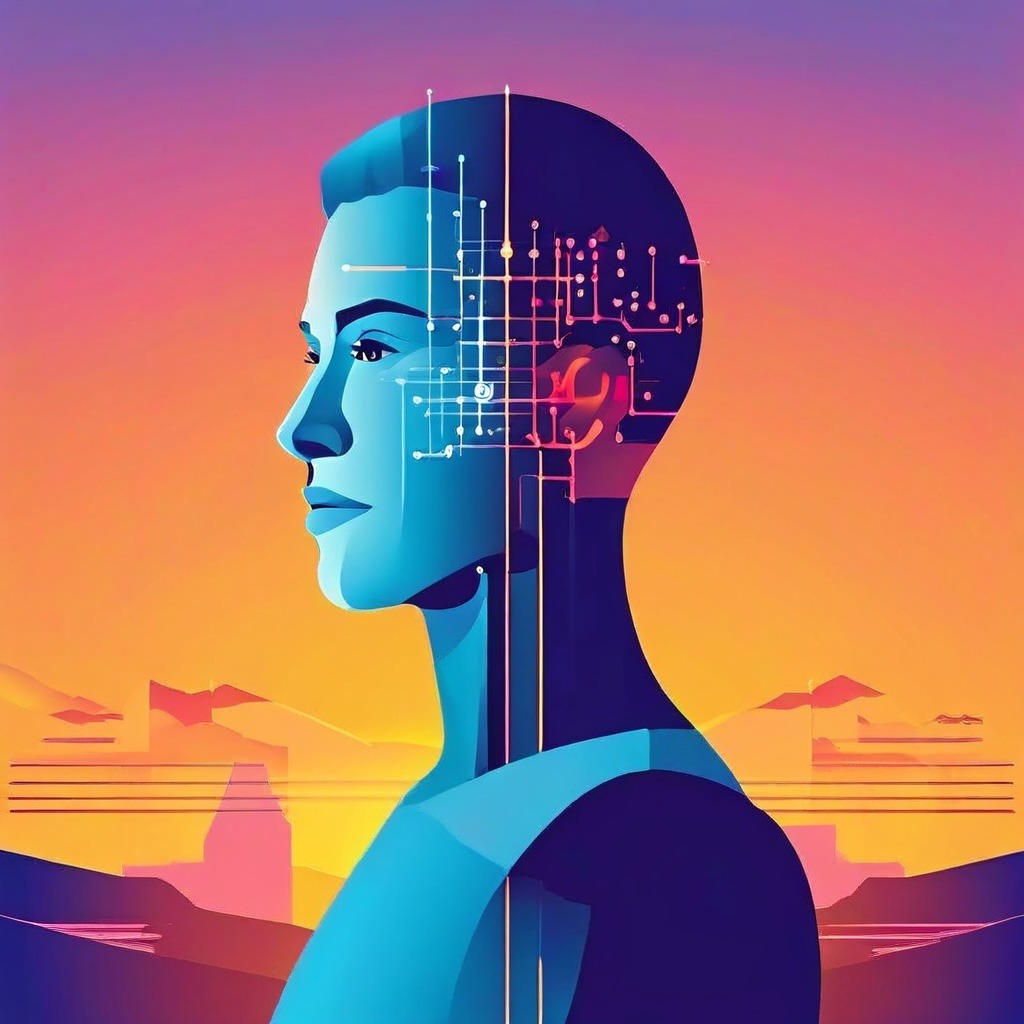The rapid advancements in Artificial Intelligence (AI) and blockchain technology are individually transforming industries. However, their convergence is where the true potential for innovation lies. The combination of AI’s ability to learn and make decisions with blockchain’s secure and transparent infrastructure creates a powerful synergy and together, they promise to unlock new possibilities and address some of the most pressing challenges in the digital age.
The convergence of Artificial Intelligence and blockchain technology is poised to transform various sectors, including finance, healthcare, supply chain, and more.
Understanding the Fundamentals
Artificial Intelligence (AI): AI encompasses a broad range of technologies that enable machines to simulate human intelligence. This includes tasks like learning from data, recognizing patterns, making decisions, and even understanding natural language.
Blockchain Technology: Blockchain is a decentralized, distributed ledger technology that records transactions across a network of computers. Its key features include immutability (data cannot be altered), transparency (all participants have a copy of the ledger), and security (cryptographic techniques protect data).
The Synergy of AI and Blockchain
The integration of AI and blockchain can be seen as a symbiotic relationship where each technology amplifies the capabilities of the other. Here are some key areas where their synergy can be particularly impactful:
1. Enhanced Security and Privacy
AI algorithms can be leveraged to improve the security of blockchain systems. For instance, AI can detect unusual patterns in transactions, identifying potential fraud or cyber-attacks in real-time. By incorporating machine learning models that evolve with new threats, blockchain networks can maintain robust security postures.
Conversely, blockchain can enhance the privacy of AI applications. Sensitive data used by AI systems can be stored on a blockchain to ensure it remains tamper-proof and transparent. This decentralized storage method can prevent unauthorized access and misuse of data, addressing privacy concerns in AI deployments.
2. Improved Data Management and Integrity
Data is the lifeblood of AI systems, and blockchain can ensure the integrity and traceability of this data. By recording data on a blockchain, organizations can create an immutable audit trail that AI models can trust. This is particularly crucial in industries like healthcare and finance, where data accuracy is paramount.
Moreover, blockchain can facilitate decentralized data marketplaces where data providers and consumers transact securely. AI can then utilize this verified and high-quality data to generate more accurate insights and predictions.
3. Decentralized AI Models
Traditionally, AI models are trained and operated on centralized servers, raising concerns about single points of failure and control. Blockchain technology enables the decentralization of AI models, distributing the computational load across multiple nodes. This approach not only enhances the resilience of AI systems but also democratizes access to AI capabilities.
Projects like SingularityNET are pioneering decentralized AI networks where developers can share and monetize their AI algorithms on a blockchain platform. This open and collaborative environment can accelerate AI innovation and accessibility.
4. Smart Contracts and Automated Processes
Smart contracts on blockchain platforms can automate complex workflows without human intervention. When integrated with AI, these contracts can become even more powerful. AI algorithms can trigger smart contract execution based on real-time data analysis, enabling automated decision-making in various applications.
For example, in supply chain management, AI can predict demand fluctuations and optimize inventory levels, while smart contracts automate procurement and payment processes based on these predictions. This integration can lead to more efficient and responsive supply chains.
5. Trust and Transparency in AI Decisions
One of the significant challenges in AI is the “black box” nature of many models, where it is difficult to understand how decisions are made. Blockchain can bring transparency to AI by recording the decision-making processes on an immutable ledger. Stakeholders can audit these records to ensure AI decisions are fair, unbiased, and compliant with regulations.
This transparency is particularly valuable in sectors like finance, where AI-driven trading algorithms can be scrutinized for compliance with regulatory standards, and in healthcare, where AI diagnostics can be validated against patient records.
Case Studies and Real-World Applications
Financial Services
In the financial sector, AI and blockchain can revolutionize processes ranging from fraud detection to trade finance. AI algorithms can analyze transaction patterns to identify fraudulent activities in real time. These transactions can be recorded on a blockchain to ensure they are transparent and tamper-proof, providing an additional layer of security and trust.
Blockchain can also streamline trade finance by automating and securing transactions through smart contracts. AI can assess creditworthiness and predict market trends, enabling more informed lending and investment decisions.
Healthcare
Healthcare is another industry where the synergy of AI and blockchain can make a significant impact. Patient data can be securely stored on a blockchain, ensuring privacy and compliance with regulations like GDPR and HIPAA. AI can analyze this data to provide personalized treatment recommendations and predictive diagnostics.
For instance, AI models can predict disease outbreaks by analyzing patient records and environmental data stored on a blockchain. This predictive capability can enable proactive measures to contain and manage epidemics.
Supply Chain Management
Supply chains can benefit immensely from the integration of AI and blockchain. Blockchain provides end-to-end visibility of the supply chain, recording each transaction and movement of goods. AI can analyze this data to optimize routes, predict demand, and prevent disruptions.
For example, a blockchain-based supply chain platform can use AI to forecast inventory needs and trigger automatic restocking through smart contracts. This ensures that products are available when needed, reducing downtime and enhancing efficiency.
Intellectual Property and Digital Rights
The protection of intellectual property (IP) and digital rights can be enhanced through the combined use of AI and blockchain. Creators can register their works on a blockchain, ensuring an immutable record of ownership. AI can monitor the internet for unauthorized use of these works, alerting owners to potential infringements.
Moreover, smart contracts can automate the licensing and distribution of digital content. For instance, musicians can use blockchain to manage royalties and ensure they are paid fairly each time their music is streamed or downloaded, with AI monitoring usage to prevent unauthorized distribution.
Challenges and Considerations
While the integration of AI and blockchain holds great promise, it is not without challenges. Here are some key considerations:
Scalability
Both AI and blockchain technologies can be resource-intensive. AI requires significant computational power for data processing and model training, while blockchain networks can experience scalability issues as the number of transactions increases. Finding efficient ways to scale these technologies is crucial for their successful integration.
Data Quality
The effectiveness of AI models depends on the quality of data they are trained on. Ensuring that the data recorded on blockchains is accurate, reliable, and free from biases is essential. Blockchain’s immutability means that once data is recorded, it cannot be altered, making initial data quality critical.
Interoperability
For AI and blockchain to work seamlessly together, interoperability between different blockchain platforms and AI systems is necessary. Standardizing protocols and ensuring compatibility can facilitate smoother integration and wider adoption.
Energy Consumption
Some blockchain networks consume significant amounts of energy due to the proof-of-work consensus mechanism. More sustainable alternatives like proof-of-stake are gaining traction.
Regulatory and Ethical Concerns
The use of AI and blockchain raises several regulatory and ethical issues. Ensuring compliance with data protection regulations, addressing concerns about algorithmic bias, and maintaining transparency and accountability are vital. Policymakers and industry stakeholders must collaborate to develop frameworks that support innovation while protecting public interests.
Future Prospects
The future of AI and blockchain integration looks promising, with several emerging trends and developments:
AI-Driven Decentralized Applications (DApps)
AI-powered DApps can leverage blockchain for secure and transparent transactions while using AI to provide intelligent services. These applications can range from decentralized finance (DeFi) platforms to AI-driven healthcare solutions, offering new opportunities for innovation.
Federated Learning
Federated learning is an AI technique that enables models to be trained across multiple decentralized devices without sharing raw data. When combined with blockchain, federated learning can ensure the privacy and security of the data used for training, enabling collaborative AI development across different organizations.
Tokenization of AI Services
Blockchain can facilitate the tokenization of AI services, enabling developers to monetize their AI models and algorithms. Tokens can be used to access AI services, create incentives for data sharing, and build decentralized AI marketplaces.
Enhanced Supply Chain Traceability
AI and blockchain can enhance traceability in supply chains, ensuring that products are sourced ethically and sustainably. Consumers can verify the origin and journey of products, making informed purchasing decisions and supporting sustainable practices.
To Summarize
The integration of AI and blockchain represents a paradigm shift in how we approach data, technology, and trust. By leveraging the strengths of both, we can create systems that are not only more intelligent and efficient but also more transparent, secure, and equitable. The future is bright for this powerful synergy, and the possibilities are limited only by our imagination.
As these technologies continue to evolve, their integration will likely become more seamless, addressing current challenges and unlocking new opportunities. From financial services to healthcare and beyond, the synergistic potential of AI and blockchain promises to transform industries and improve lives in profound ways.
Embracing this convergence requires a collaborative effort from technologists, policymakers, and industry leaders to ensure that the benefits are realized while addressing ethical and regulatory concerns. With thoughtful implementation, AI and blockchain can pave the way for a more secure, transparent, and intelligent digital future.
MORE on Blockchain Technology
HERE is another interesting blog post from The Missing Prompt





